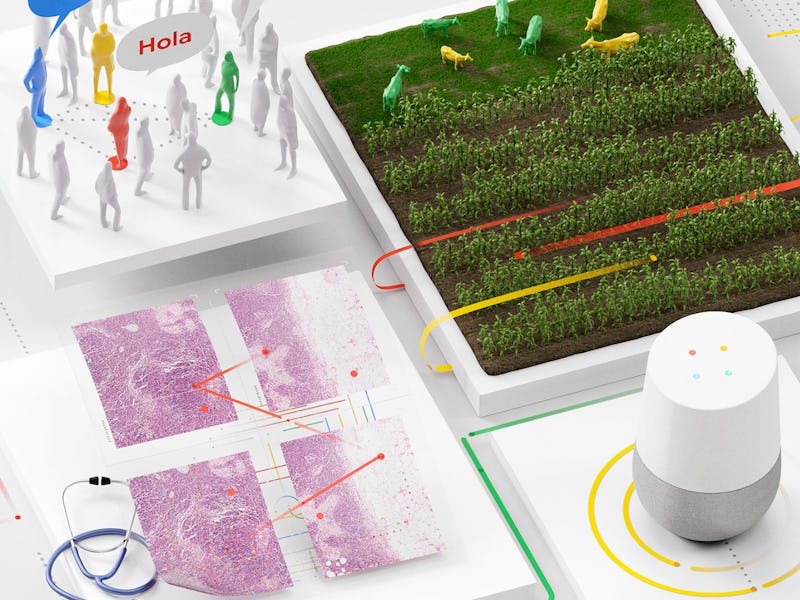The first day of Google I/O made one thing abundantly clear: Google is determined to take artificial intelligence into the mainstream by implementing it in a huge portion of its products. Everything from the announcement of Android P to improvements to Google Duplex worked in some form of A.I. technology.
Google’s push on this front could bring machine learning into the mainstream, instead of sequestering it in big data and computer science research. Here are the products announced at Google’s developer conference that will put A.I. at the fingertips of consumers around the world.
What Is Google Lens? It Might Be I/O’s Biggest Announcement
Google Lens is possibly the best example of how A.I. can be used to develop incredibly useful software for consumers. It’s essentially Googling something minus the search bar.
Google Lens App Updates and How to Use It
All you need to do is point your phone’s camera at something and the app will bring up relevant information about whatever it’s looking at. This combines a number of the company’s strengths, like its flagship search engine and computer vision, into a sleek, easy-to-use program. The app itself was announced during last year’s Google I/O, but the company has made some big updates to it that really opened up to infinite potential.
Aside from now coming built into Android smartphones, it can pretty much recognize anything a human could. You can point it at a dog to identify its breed, text from a restaurant menu to bring up a photo, or even a landmark to get some background information from Wikipedia. Right when you thought Googling something couldn’t get easier, now you don’t even have to type.
Beyond Google Lens: Google Duplex Sounds Just Like a Human
Smart home devices like Amazon’s Alexa have began using A.I. to try and assist you through your daily routine, but Google has taken this a step further. Google Duplex will allow the company’s Assistant device to make calls on your behalf with a voice that’s indistinguishably natural-sounding. Now this virtual assistant will actually be able to help you in the real world by booking appointments, instead of just relaying information when you ask.
“The assistant can actually understand the nuances of conversation,” says CEO Sundar Pichai. “We’ve been working on this technology for many years, it brings together all of our investments over the years in natural language understanding, deep learning, and text to speech.”
This feature is still in its development phase, but Google will be testing it extensively over this summer. Once it’s released, Duplex may revolutionize how we think of virtual assistants.
More Google I/O Announcements: Google Assistant Can Hold Conversations
While Duplex’s game-changing features are still in the works, Google is rolling out some sizable improvements to its Assistant. The one you’ll probably notice first is the new voice options (including one voiced by John Legend) coming to the device.
Google used real voice actors to develop these and ran their sound clips through its WaveNet A.I. tool that has the ability to learn and mimic human voices, making for more natural sounding voices.
The Google Assistant will also get better at keeping a conversation. Instead of you saying “Hey Google” every time you want its attention, the device will now be able to detect when a conversation is still going after the initial prompt. It will also gain the ability to answer multiple questions at once so you can ask, “Who is Sundar Pichai and where was he born?”
So now you can chat with your smart home and not feel like you’re talking to a toaster.
Google I/O Announcements: Android P Predicts App Habits
Google’s next-generation mobile operating system, Android P, also came with a few A.I. features that will try to enhance your smartphone experience. App Actions will predict what app you may want to use next as your browsing your phone. It’ll familiarize itself with your daily habits and suggest apps you might be interested in opening at certain times.
Android P will also take this information to autonomously maximize your battery life. The OS will prioritize the apps you use most often and put all others to sleep in order to reduce power consumption. This battery-saving feature will also adjust your brightness when needed to make sure you’re getting the most out of your device.
Google I/O Announcements: Google Photos’ A.I.-Powered Editor
Using Google’s cloud service to store all of your pictures now comes with new A.I. powered editing tools. Aside from giving you the ability to easily touch-up your pictures, Google Photos will use computer vision to suggest certain edits. Say your photo is a little dark: The app will bring up a small notification at the bottom of your screen that will let you tweak the image with the touch of a button.
The app also has the ability to fill in black-and-white photos with color, separate people from the background, and autonomously turn a picture of a document into a PDF.
